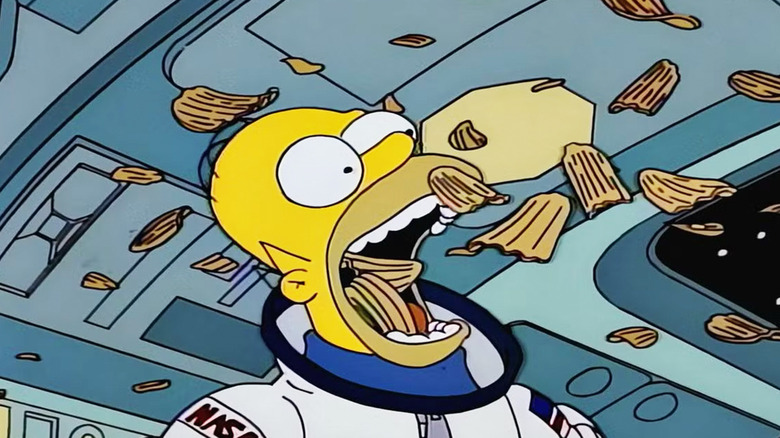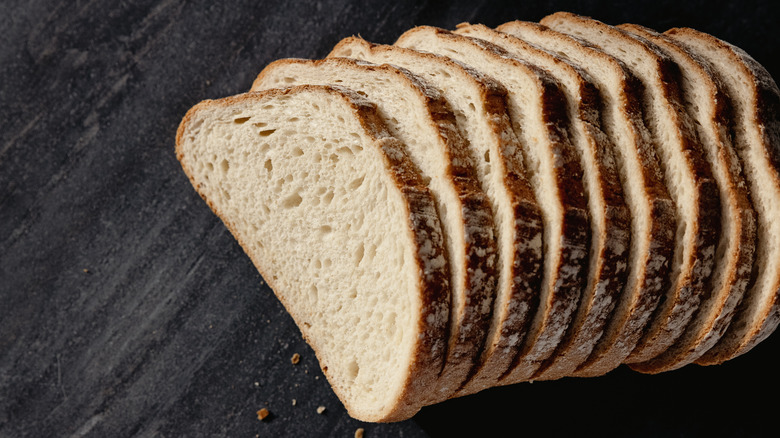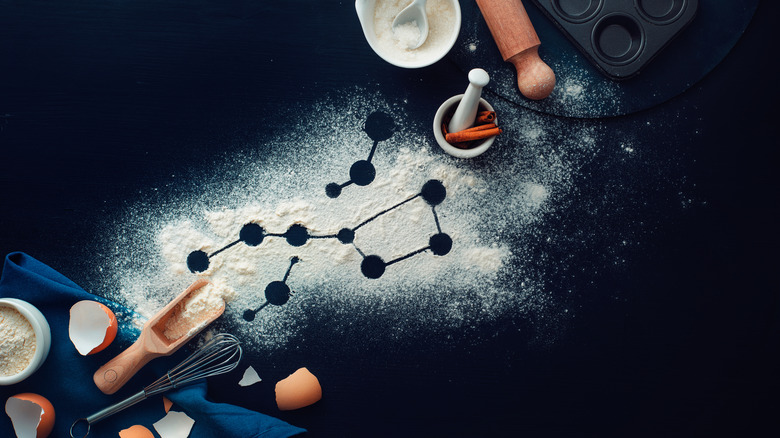The Popular Carbohydrate Astronauts Can't Eat In Space
Dining options might not be the first thing you think about when it comes to space launches, but it's a pretty important thing — and not just because astronauts need to sustain themselves in orbit. There are only certain types of food that can be sent into space, and a popular carbohydrate isn't among them.
The first man in space was Soviet cosmonaut Yuri A. Gagarin, who on April 12, 1961, boarded the Vostok 1 capsule and circled Earth for 108 minutes. But Gagarin wasn't just the first human in space, he was the first person to eat in space — though the meal wasn't exactly fine cuisine. The Russian cosmonaut sustained himself with an aluminum tube full of beef and liver paste which he squeezed into his mouth before doing the same with a tube of chocolate sauce for dessert.
This method of consuming food pastes from tubes became the standard for astronauts in the years after, confirming that humans could indeed digest food while in the weightlessness of space. During the Gemini program — which took place in the 1960s and was designed to test equipment and train astronauts in Earth orbit for future Apollo missions — space travelers started to get something a little more appetizing that liquified food in tubes. Freeze-dried meals were introduced as part of the program, and suddenly astronauts had a wide array of food items to choose between. All they had to do was reconstitute the meals using water from their onboard supply. It was during the Apollo missions to the moon, which took place between 1967 and 1972, that NASA first tested out sandwiches as a possible onboard snack. But astronauts encountered an issue which has meant that ever since, bread is one of the main foods that's effectively banned from spacecraft.
Bread is surprisingly dangerous in space
Any fan of "The Simpsons" will remember season five's "Deep Space Homer," in which Homer Simpson is sent to space as part of NASA's attempt to boost the ratings for its launches. While in orbit, he opens a bag of chips only for astronauts Buzz Aldrin and Race Banyon to react with shock. "Homer, no!" says Aldrin, before Banyon says, "They'll clog the instruments." As it turns out, the animated astronauts were right to worry, as it turns out that clogging the instruments is actually a big concern when it comes to certain types of foods on spacecraft.
This is, as it happens, one of the main reasons crew members can't have bread in space. As NASA explains, not only does bread go stale very quickly in space, it produces crumbs which float in the cabin and could harm the equipment. Evidently, the agency was also worried about these crumbs getting in astronauts' eyes or lungs.
As such, sandwiches were pretty much ruled out during the Apollo missions, but in November 1985, a crewmember aboard the space shuttle Atlantis asked for tortillas instead of bread. Rodolfo Neri Vela, a Mexican payload specialist, seemed to have solved the bread problem, as the tortillas didn't produce the same crumbs. Ever since, tortillas have been a staple of astronauts' diets, especially on the International Space Station, and are used to make everything from burritos to hamburgers and sandwiches.
Bread is just one of many foods banned in space
Though bread has been effectively banned from space flight, that doesn't mean nobody has ever enjoyed this particularly popular carbohydrate while in orbit. Astronaut John Young, for example, travelled onboard the Gemini 3 as part of the Apollo missions and managed to smuggle a corned-beef sandwich onboard with him, triggering a small but surprisingly intense controversy. According to official transcripts from the mission, crew mate Gus Grissom tried the sandwich but was forced to put it away because it wouldn't "hold together" (via Space). While it might seem like a minor issue, the offending snack actually caused quite a stir back on Earth, prompting a review by the U.S. House of Representatives' Committee on Appropriations. The review raised concerns about the crumbs clogging the instruments, to use "Simpsons" parlance.
Incidents such as this helped keep bread off spaceflights for decades, but it's not just this carb that's banned. Alcohol is completely prohibited on the ISS, as are many products that contain alcohol, such as mouthwash, perfume, and aftershave. Likewise, carbonated drinks in general are banned due to the fact the dissolved carbon dioxide contained in them can cause problems for astronauts, resulting in acid reflux-like symptoms. What's more, salt and pepper are prohibited for similar reasons as bread in that they can float in the cabin and damage the instruments or be inhaled by astronauts.
In 2017, reports of a new "crumb-free bread" emerged after Germany-based company Bake In Space developing a new dough mixture and oven designed for the International Space Station. It's not clear whether NASA has officially adopted this bread for the ISS since then, but it seems like it's only a matter of time before this banned carb gets the all-clear for spaceflight.


